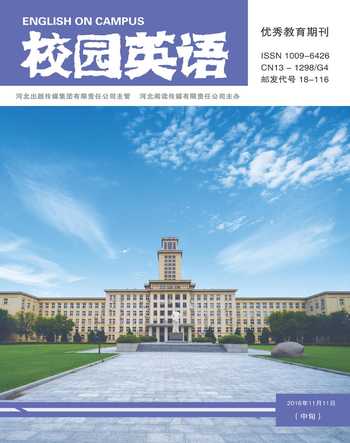Comparison and Translation of English and Chinese Animal Idioms
苗松旸
【Abstract】There are a lot of animal idioms in both English and Chinese which make a language more vivid and special. While, the modes of thinking and cultural background are different in English and Chinese, so the implication of the same animals are possibly different.
【Key words】English and Chinese; animal idioms; implication; translation strategies
1. Comparison of English and Chinese Animal Idioms
(1) Coincidence in the implied meaning of English and Chinese animal idioms
On the one hand, the features of some animal images in English are equal to those of Chinese, and this kind of phenomenon is called cultural overlaps. For example, we both have donkey in English and Chinese to express obstinate and stupid, and “as obstinate as a donkey” is used to describe someone who is stubborn. On the other hand, some animal idioms express a kind of quality of a person or a object that is similar to that of the animal involved. For example, when the “raven” stands for “black”, it can be used both in English and Chinese, like “as black as a raven” (黑得像乌鸦).
(2) Diversities in the implication of English and Chinese animal idioms
In this case, the frequently seen example is “dragon”. In Chinese culture, “dragon” is the symbol of Chinese nation, China is the hometown of “dragon” and we Chinese are the descendents of “dragon”. We have many kinds of animal idioms with “dragon”, such as “望子成龙”, “龙飞凤舞”. However, “dragon” in western culture is treated as a symbol of disaster and evil. In literature, we often see the dragon is killed by a hero after a horrible fight.
(3) Vacancies in the implicaion of English and Chinese animal idioms
Owing to several reasons, a kind of animal may have an implied meaning in one language but dont have such implied meaning in another one, or in another country there is no such kind of animals at all. For example, “鸳鸯”(mandarin duck). For mandarin ducks often appear in pairs, Chinese take mandarin ducks as lovebirds and use “鸳鸯戏水”, “鸳鸯璧合” and other idioms to express true love. But in English, “鸳鸯” is rarely known by people, not to mention its meaning.
2. Translation Strategies of English and Chinese Animal Idioms
(1) Literal translation
In English and Chinese, there are some animals which are used to be compared to the same implied meaning. In this case, the animal idioms can be translated directly into the target language, for example, “fish in troubled water” belongs to coincidences in implied meaning. In both Chinese and English, there happens to be the same meaning, therefore, it is translated into Chinese directly “浑水摸鱼”.
(2) Alternative translation
When different animals in two languages have the same or similar implication, the animal in one idiom is translated into another animal in the target language. We need to find the animal with the same meaning in the target language to replace it to make readers from different cultural backgrounds understand, such as “the black sheep” is translated into “害群之马” in Chinese. We have known that sheep doesnt have the same corresponding animal in Chinese, however, “马” happens to be compared to the similar meaning.
(3) Free translation
The same animal may have different meanings in two languages. Therefore, we should translate these idioms according to their meanings. The most representative one is “dog”. A dog is a humble animal in Chinese culture and the idiom with it are mostly negative, such as “狐朋狗友”, “狼心狗肺”. While, a dog in English has the opposite meaning, so when translating, one ought to pay attention to it, for example “a lucky dog” means “幸运儿” in Chinese. We cant translate the idiom directly into Chinese like “幸运狗”, which will definitely cause misunderstanding in intercultural communication.
(4) Filling-up translation
Some animal idioms in English and Chinese originate from its special literature, religion or custom, so their corresponding images cant be found in the target language. For example “a fly (butterfly) on the wheel” from Aesops Fables refers to someone who thinks that he himself has great ability. In this case, its better to translate the idioms literally and to add its inner meaning at the same time, for example, “kangaroo court”-“袋鼠法庭(a court by a group of people who have no legal rights to judge but still organize a court secretly to decide someones conduct)”.
References:
[1]欧忆.贾德江.英汉动物类习语比较及翻译[J].中国科技翻译,2001.
[2]马红梅.鲁光伟.英汉动物习语对比及翻译策略[J].甘肃科技,2012.
[3]Kramsch,C.Language and Culture[M].Shanghai Foreign Language Education Press,2000.

